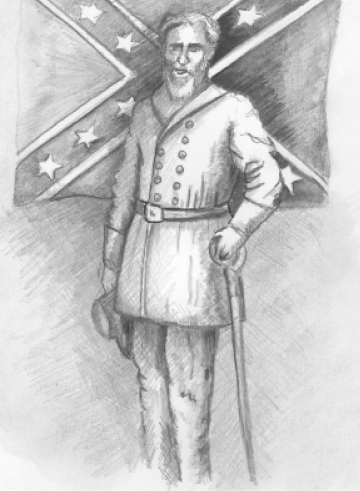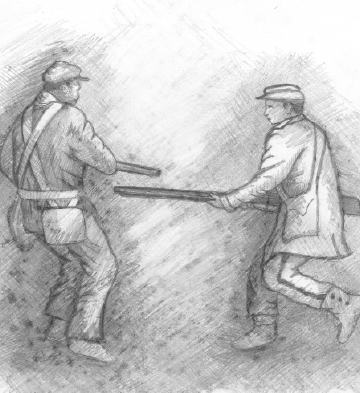2
After supper that night, Jeremy went to see his friend Willie. Jeremy learned that Willie’s uncles and cousins had run away from their masters to fight for the North. Willie said that the slaves wanted the North to win the war because that would free all of the slaves. He told Jeremy that some slave owners were good to their slaves but others were awfully mean. Willie’s sister was sold to one slave master, and her husband was sold to another slave master, and her little baby was taken from her arms and no one knew what had happened to that baby. His sister’s slave master was very hard on his slaves, Willie told Jeremy. That slave master beat his slaves when they disobeyed him.
“My mamma cries about my sister all the time,” said Willie.
Willie said he would like to be free so he wouldn’t have to work all day in the fields and could go to school and learn to read.
“Willie,” Jeremy said, “I could teach you how to read.”
But Willie told him it was forbidden to teach slaves how to read and both of them would get a beating if anyone found out.
Jeremy was surprised at himself for not thinking about these things before. He hadn’t thought about buying and selling people like you’d buy and sell a horse. And he hadn’t thought about how terrible it would be to have his family split up and sold to mean people. He figured that the people who wanted to get rid of slavery had probably been thinking about all these things for a long time.
As the war continued, life in the North and the South got harder, but there were more hardships in the South since so many men went to fight for the Confederacy and left all the chores to the women and children. Also, since so many of the battles were fought on Southern land, the crops were being destroyed and food was getting scarce.

General Robert E. Lee was the Confederate general who Jonathan described as a “great leader” in his letter to Jeremy.
Jeremy and his mother heard stories about the terrible battles and he waited anxiously to receive news from Jonathan. But the first letter from his cousin didn’t arrive until December of 1862.
Dear Jeremy,
This war is worse than I ever imagined.
Remember I told you about the battle at Manassas, which the North called Bull Run? Well, when I arrived in August, they sent me there to fight the second battle of Bull Run. I’m proud to say that the South won.
But while I was fighting next to one of our neighbors, a shell hit him and blew off part of his leg. There is no hospital here, but they converted one of the large homes into a place where we carry the wounded. I stopped by to see him and saw that they had cut off the rest of his leg. Infection had set in and there was no way to stop it from killing him without taking the leg. There’s no medicine that can stop infection. I have seen so many soldiers missing legs and arms. In fact, I have seen arms and legs all by themselves, piled up on the battlefield where they were blown off of the men or were amputated.
But I’m not discouraged. The South is fighting well and that win at Manassas was a good one.
In September, we fought in Maryland. We have a great leader, General Robert E. Lee. He wanted to take control of the Union’s weapons supply located at Harper’s Ferry, so he split his forces to accomplish his goals and sent written orders to his officers to let them know of his plans. We did take Harper’s Ferry, but one copy of the orders was dropped by accident and found by a soldier from the North. This tipped off the North about our locations. We met the Union troops around Sharpsburg, Maryland, at Antietam Creek.
The battle lasted only one day but 23,000 men were severely wounded and 4,800 of them died right there on the field. Many others died later of infection. If you can imagine seeing 4,800 dead bodies and thousands lying on a field, badly hurt, you know what it was like. We had only 40,000 troops from the South fighting 87,000 troops from the North. The army here called it the bloodiest one-day battle they had ever seen. Some of the soldiers killed each other with bayonets. That’s a terrible thing to see. The battle was a draw between the North and the South.
Then in December, we went onto Fredericksburg in Virginia on the Potomac River and fought with the Union soldiers again and this time we won. Thank the Lord!
President Lincoln replaced his General McClellan, because he was not taking advantage of opportunities to fight. President Lincoln seems to have a hard time finding the kind of military leaders like the South’s Stonewall Jackson and Robert E. Lee.
I’ve learned a few things in this war about men. Some of the ones you think will be strong, might be cowards, and some you figure will be weak, turn out to be strong fighters. Some of them fight honorably and some are just plain mean and might stab someone who is already wounded. We are called Rebels or Graycoats. And they call our Confederate flag the Rebel flag. We call the Northerners, Yankees or Federals or Bluecoats. Their flag is the Stars and Stripes that used to be our flag. I also learned that most of us from the South joined up as volunteers, but the soldiers from the North were required to fight and some were paid to join. They call that conscription, when you tell a man that he has to fight for his country. Some of our Southern boys are starting to be conscripted also, because we need so many soldiers for this war.
You know, little cousin, that the Confederates can’t win every battle against all the soldiers that they have in the Union army. But if we can at least convince the North that we will fight well and never give up on what we believe, then maybe we can convince them to leave us alone and let us secede from their Union.
Well, I will close this now and I’ll write again as soon as I get the chance.
Your cousin,
Jonathan
Jeremy read the letter five times, then put it into his Bible for safekeeping.

Jonathan wrote that during the battle of Antietam, called the bloodiest one-day battle of the war, soldiers sometimes even killed each other with bayonets.